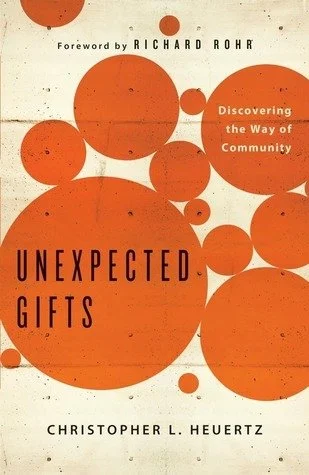Unexpected Gifts
Chris Heuertz’s new book Unexpected Gifts is about community, and since Bo White (@bomwhite) and I read it around the same time, he asked if I’d like to review it together. The first half of the review, presented in interview form, appeared on his blog yesterday. The second half is below.
By the way, be sure to read all the way to the end for a chance to win one of three free copies of Unexpected Gifts!
Bo, I’m sure you came into this book already having an understanding of what community means and what it looks like. How did this book challenge that understanding?
Most books avoid topics like betrayal and transition and I found these contributions to be the highlight for me. I read a ton and so there’s always some article, blog, or book mulling around in my head, but I cannot recall too many times that betrayal is actually taken on or the importance of transitions. When my parents divorced, my family (the first community I entered) was devastated in many respects and the transition from a family of four to four individual, but related families has taken quite some time.
I believe that the idea of transition is often overlooked and that’s unfortunate. How many sermons have you heard on the ascension of Christ? In my experience, I can count them on one hand, but that is one serious transition. As a father of two, transitions impact my children as well. The challenge that this book brought to light is that transitions and betrayal are more common than we’d like to admit, but our avoidance of those topics is all too common to our detriment.
I don’t know about you, but as I read Unexpected Gifts, I was reminded of Life Together, Dietrich Bonhoeffer’s classic book on community, in which he writes, “Christianity means community through Jesus Christ and in Jesus Christ. No Christian community is more or less than this.” Christian community should have a way of breaking down walls, which Chris really hammers home, but it seems it paradoxically also has to have its proper boundaries, or it ceases to be distinctly Christian. But you’re the one with a seminary degree – what do you make of that paradox?
Seminary is an odd place and serves as an illustration to what you are asking. On the one hand, every single person is getting a graduate degree and every single person is studying the Bible intensely, growing theologically, and seeking to prepare for ministry of some kind. Yet, the place isn’t reflective of life in almost any other setting. No church or company is full of people studying their Bibles in multiple languages on a daily basis nor are church leadership boards receiving training in apologetics, communication, and counseling. In seminary, though, every person is being trained Biblically and theologically to enter a culture that is increasingly marginalizing the Bible, questioning the validity of truth, and this is emotionally taxing. So, the walls are easy to erect on a variety of levels, particularly for Christians seeking to live in community with other Christians. So many are now trying to preserve something that is increasingly rare and once it’s found, people don’t want to jeopardize it by inviting others in.
Breaking down the walls that Chris references while maintaining the devotion to Christ as Bonhoeffer references happens in reverse order. Christ, I believe, breaks down the walls that we all erect, otherwise, we tend to move toward exclusion of those different than us. Peter couldn’t accept the Gentiles until confronted with their own dignity, worth, and value endowed by God. And Acts is the unfolding drama of God building a community that invites everyone. The boundaries set by God seem different than the ones we often set up and therein lies the challenge. Part of this is our own personal and collective self-awareness: for example, why is Jesus so content with his God and his relationships and so many of us are discontent with ours, but claim to follow this same Jesus? This challenge won’t go away and perhaps the “Unexpected Gifts” won’t be enjoyed fully until the walls we erect are more aligned with what God is building.
So, what are the takeaways that readers of Unexpected Gifts should seek to apply? Are there at least one or two things that people can begin to think about in their respective communities today?
As I mentioned earlier, the idea of succession or transition can be reflected on more intentionally and this is something I am seeking to understand more deeply myself. John Wooden once said that when opportunity comes it’s too late to prepare, so perhaps a take-away is to ask myself if I have prepared myself or others for transition and/or new opportunities? And have I done this preparation in community with others or in isolation and more by myself? Perhaps, the “Unexpected Gift” of doing some things in community rather than alone is not that it’s faster, it isn’t, but that it’s fuller and multi-dimensional.
Book Giveaway
We’re giving away three free copies of Unexpected Gifts. Each time you do one of the following “actions” you’ll earn one entry:
Tweet this review, tagging @tjhoiland, and including the hashtag #UnexpectedGifts
Share the review on Facebook
Make a donation to Word Made Flesh – each dollar donated counts as one entry (hint: this is a great way to increase your odds of winning!)
Whether you tweet, share, or donate (or all three!), be sure to let me know in the comments so I don’t miss any of your entries. Winners will be announced this Monday, March 18.
Disclosure: I received a free copy of this book from Howard Books, for my honest review. The opinions expressed here are my own.
